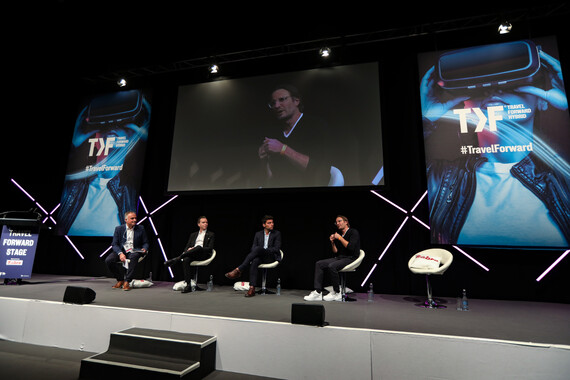Technology tools that support Automation are emerging as mission-critical for the recovery of travel, according to experts on stage at Travel Forward.
Many travel companies were forced to furlough staff during the pandemic, at the same time as tech budgets were cut.
But some companies were able to continue developing digital solutions and are now ready to face the new normal with a re-calibrated relationship between tech and humans.
Automation is being reframed beyond its cost reduction role and is now seen as contributing towards incremental revenues while improving the traveller and employee experience.
Dave Bishop, chief commercial officer for Gray Dawes Group, the UK’s oldest TMC, explained how it is “automating upsells” through its tech partnership with Grapevine.
By using machine learning, Grapevine is helping Gray Dawes improve its attachment rate by identifying which travelers haven’t booked their hotel. It identifies “windows of opportunity” for upsells and automates the notifications based on analytics.
For Gray Dawes this lifts revenues and “frees up staff from the nitty gritty and allows them to concentrate on high-touch high-value interactions.”
Similarly, Andrea Nicholas from Green Tourism shared insights from the Association of Scottish Visitor Attractions, which confirmed a correlation between technology adoption and customer satisfaction.
By necessity, many attractions adopted online booking and visitor management technologies for the post-COVID re-opening period. The tech-enabled social distancing and helped avoid overcrowding, while the online booking option reduced face-to-face contact and queues at the ticket office.
“As a result 30% of visitors had a better experience,” she said, “so we think these technologies will continue to be used and will encourage a shift away from volume towards value.”
Lemax, a SaaS provider from Croatia, operates in the highly fragmented and complicated area of multi-day tours. It allows its tour operator, travel agent and DMC clients to aggregate all documentation related to the trip and automates communication with the supplier and with the traveller.
Iskra Skoric, Business Development Representative at Lemax, said “There are many touchpoints behind the scenes in a multi-day tour, and our clients tell us that the more they are able to automate, the more time they have to spend on areas which need the human touch.”
Another area where Automation has a direct connection to the bottom line is payments. Technology and payments giants Amadeus and Mastercard jointly presented a session which outlined the benefits of virtual cards, which allows travel companies to streamline many of the processes – and costs – associated with business-to-business payments.
Simon Press, Exhibition Director, WTM London and Travel Forward, said: “Automation was originally seen as a way to streamline and reduce costs, but today travel firms and their tech partners are talking about its role in improving the traveler experience, empowering staff, increasing revenues and strengthening partnerships.
“It’s another example of how travel technology never stands still.”
